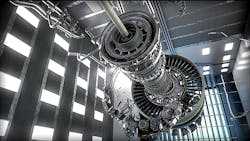GE Aviation reported that ground tests have started on a GEnx jet engine built using lightweight and heat-resistant ceramic matrix-composite (CMC) components. The CMC parts are the engine’s high-pressure turbine (HPT) and combustor, formed by additive manufacturing.
The GEnx is a dual-rotor, high-bypass turbofan jet engine developed and manufactured by GE Aviation for the Boeing 787 Dreamliner and 747-8 aircraft, with the research directed as well at the GE9X, a smaller variant of the GEnx developed specifically for the Boeing 777-8x/9x aircraft. The engine builder has said it would invest $500 million this year in technology and product development for the GE9X.
According to the OEM, nearly 700 orders have been taken for the GE9X since it was launched last year. The first engine will be tested in 2016, followed by flight-testing on GE’s flying test bed anticipated in 2017. Engine certification is scheduled for 2018.
CMC materials are formed by suspending silicon-carbide ceramic fibers in a ceramic resin, and then finishing the parts with proprietary coatings. CMC components reportedly have one-third the density of metal, which provides the weight reduction that promotes higher fuel efficiency.
In addition to developing materials, GE Aviation has pioneered some additive manufacturing processes for high-volume turbofan engine parts.
CMC materials also are more durable than cast or forged metals, so the engines achieve longer service life. GE Aviation further noted that CMCs are more heat-resistant than metals, and require 20% less cooling air, which improves overall engine efficiency.
GE has said that developing CMC applications is among the developmental priorities for GE Aviation and the GE Global Research Center.
GE Aviation manufactures CMC materials at its Newark, Del., and Asheville, N.C., operations.
The testing underway at GE Aviation’s research center in Peebles, Ohio, aims to determine the performance of CMCs in the engine’s hot section, including inner and outer combustor liners, high-pressure turbine Stage 1 shrouds and Stage 2 nozzles.
CMC HPT Stage 1 nozzles will be tested on the second build of this demo engine, the builder indicated.
“For the GE9X, GE is applying its extensive knowledge of CMCs into the engine’s hot section,” explained Bill Millhaem, general manager of the GE90/GE9X engine programs. “The GEnx engine testing campaign, which began in late January, will allow us to demonstrate the functionality and durability of the full suite of CMC hot-section components, and help the team lock down the final design for the new GE9X engine by mid-2015.”
About the Author
Robert Brooks
Content Director
Robert Brooks has been a business-to-business reporter, writer, editor, and columnist for more than 20 years, specializing in the primary metal and basic manufacturing industries.
